Summary:
Two recent NewsWhip reports highlighted that “engagements [on Facebook] dropped across the board for the top publishers” in September. The CAP Action Analytics team looked into this more closely and confirmed a decrease in average engagement on link posts across a wide array of Facebook pages between July and September. While this appears to affect both conservative and progressive pages alike, conservative pages rely more heavily on link posts for their engagement, making this a trend to watch more closely going forward.
These observed changes occur throughout a period in which Facebook has been responding to heavy scrutiny about the types of content it promotes. In mid-August, Facebook released its first “Widely Viewed Content Report” to counteract the ideas that right-wing propaganda dominates its site — although an earlier, shelved version of that report painted a conflicting picture. Then, on August 31, Facebook announced that tests to reduce political content in news feeds were being expanded internationally. These events do not directly explain the observed changes in engagement we see in this report, but are helpful context to accompany these findings.
Methodology:
Using data from the social listening tool NewsWhip, CAP Action built a database of Facebook posts from a set of 500+ politically-oriented progressive and conservative pages between July 1 and September 20, 2021. The September 20th cutoff is to avoid some data inconsistencies in our exports that were introduced in late September. This dataset consists of approximately 162,000 Facebook posts, including 94,000 link posts. We define engagements as a sum of shares, comments, likes, and other reactions — not including link clicks, post clicks, or views.
Findings:
In accordance with the Newswhip report, we found that from July to September, average post engagement by month:
- Declined by 17% on progressive pages
- Declined by 13% on conservative pages
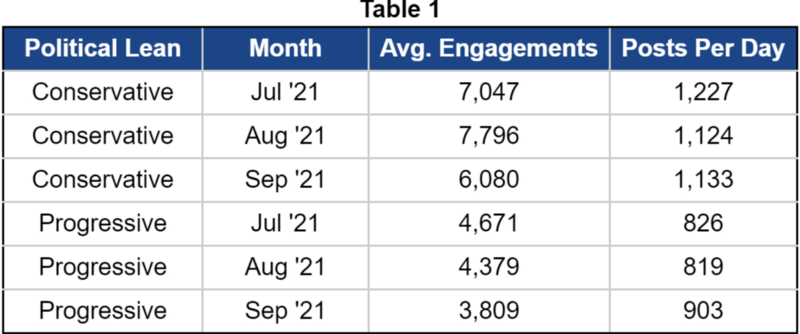
This is despite the relatively consistent volume of posts (see below).
Note that August 2021 was a high-water mark in engagements overall for conservative pages, largely due to the Afghanistan withdrawal. For that reason, we consider July to be a more accurate baseline from which to measure changes.
When we break this data out into link posts vs. non-link posts, we see a clearer trend:
- Link posts: There has been a noticeable decline (about 20%) in average engagements for conservative and progressive pages alike between July and September.
- Other post types: About even in engagement over the same period
The following two charts show average engagements per post on conservative and progressive pages tracked in our database for link posts (above) and all other posts (below):
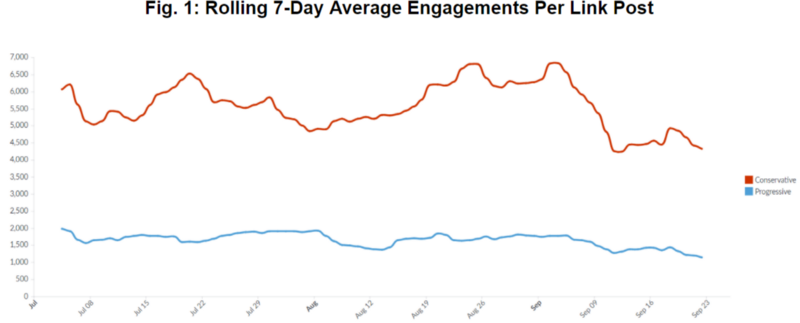
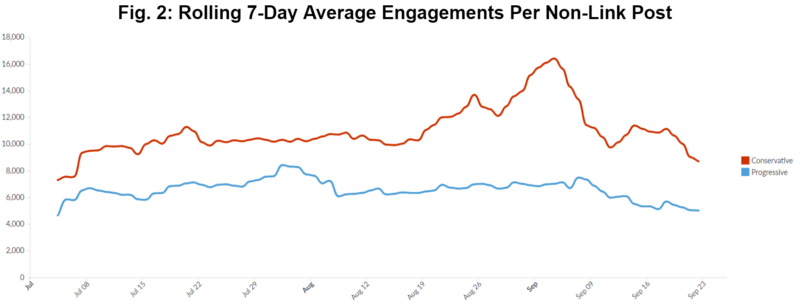
Notice that the gap in average engagements between progressive and conservative pages is higher for link posts than it is for other formats. If engagements with link posts continue to decrease across the board, that could have the effect of narrowing the overall engagement gap between conservative and progressive pages.
Conservative pages averaged roughly 5,500 engagements per link post in July, which went down to 4,500 in September. Meanwhile, non-link posts showed no decrease. For progressives, we see a slight decrease in engagement for both link and non-link posts. See the full monthly breakout in the Appendix.
We then looked closer to see how that July-September decrease broke out across the top 25 sites in our database.
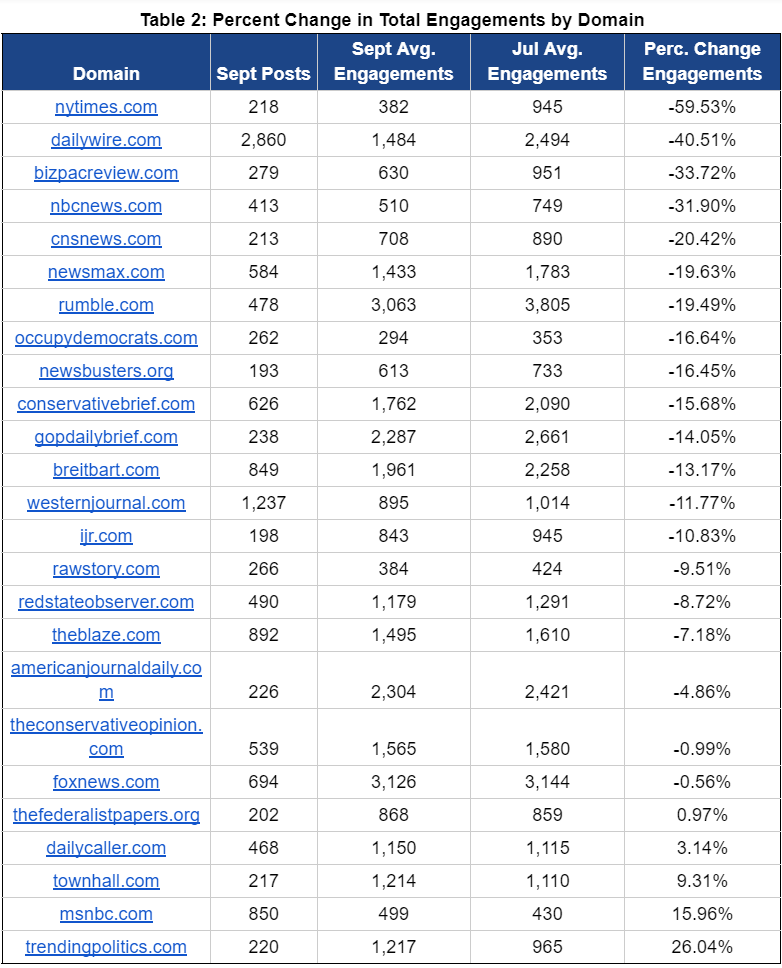
- Notably, the New York Times had the largest proportional decrease in average engagement between July and September, although the numbers being compared are relatively small.
- By contrast, the Daily Wire saw a significant decrease both proportionally (-40%) and absolutely (-1,000 engagements/post). In total, the Daily Wire received almost 3 million fewer engagements on its September posts than it would have by July rates.
- But a large array of other conservative and progressive domains also saw decreases, though these varied widely — and some, such as MSNBC, even saw modest increases.
Zooming Out
While we do not have access to a more granular, post-level dataset going back to the start of 2021 or previous years, we can validate these top-level findings in NewsWhip Analytics with specific domains. In this case, we pulled aggregate Facebook engagements for articles published by four sites (The Daily Wire, Breitbart, The New York Times, and MSNBC) for each year between 2016 and 2021, stitched the data together, and graphed the result.
The chart below is a representation of monthly engagement on articles from four of these sites shared by all public Facebook pages in the NewsWhip database — a broader set of pages than our list of progressive and conservative pages.
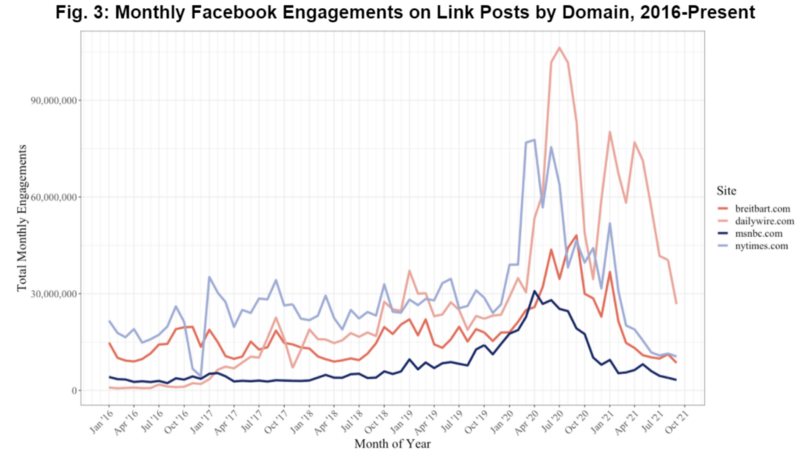
The year-over-year findings are significant. First, we can see that spring and summer 2020 led to a massive spike in engagements for each site — which makes sense given the onset of a global pandemic, a presidential election kicking into gear, and the largest movement of protests in U.S. history. Second, the increase in engagement for the Daily Wire (and to a lesser extent, Breitbart) in 2020 was disproportionate, far out-pacing the New York Times in engagement by June 2020 after years of lagging behind it.
Third, after the Biden administration takes office in January 2021 we see both the New York Times and Breitbart experience a sharp decrease in engagements, reflective of the return to normalcy and a “boring” presidency. MSNBC’s decline came much earlier, in fall 2020. But the Daily Wire’s engagements held staying power, continuing to rack up tens of millions of engagements a month well into 2021. Only in the last couple of months, with one drop in July and then another in September, has the Daily Wire experienced a decline towards pre-2020 levels.
Note that data on two additional domains, the Western Journal and NBCNews.com, displayed similar trends but was omitted from this chart for readability. For an expanded version of the chart, see the appendix.
Impact
Why is this important? A significant part of conservatives’ Facebook strategy is centered around sharing links from conservative news outlets or aggregation sites.
- We estimate that 70% of all posts from conservative-leaning pages in our dataset are link posts — compared to just 42% for progressive-leaning pages.
- This strategy has been reflected in the Twitter account @FacebooksTop10 (curated by Kevin Roose), where the top ten link posts in the U.S. for a given day have long been dominated by conservative pages.
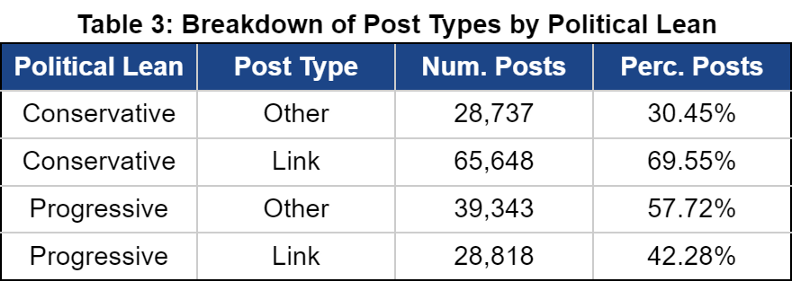
Moreover, frequently conservative Facebook pages are stood up solely to disseminate links to one site. There are more than 40 conservative pages in our dataset where at least 70% of their Facebook posts are links to a single domain, compared to only 13 progressive pages.
- On the conservative side, that includes six pages operated by the Western Journal and five pages that primarily share Daily Wire links, including Ben Shapiro, Matt Walsh, and Michael Knowles.
- On the progressive side, that includes some MSNBC-affiliated figures such as Rachel Maddow and Chris Hayes sharing MSNBC links.
We also looked at the messages being pushed within link posts with both progressive and conservative pages, and how those might be affected by these changes. We focused on two topics that have been rife with misinformation recently: the pandemic response and conflicts over vaccines, as well as the fabricated controversy over critical race theory (CRT) in school curricula being driven by conservative outlets.

- Matching post text, link text, and image text to keywords relevant to these topics, we found that engagement with CRT-related content decreased slightly on progressive pages and decreased dramatically on conservative pages, by more than 25%.
- Engagement with pandemic-related content increased slightly on conservative pages and took up a larger portion of all posts, while it decreased slightly for progressive pages.
How might this translate into reach, and how many people are vulnerable to misinformation? Based on our internal page data, we estimate that each engagement is roughly associated with 20 people reached on average. Extrapolating that outward for a conservative page with similar performance, a decline of 1,300 engagements means that 26,000 fewer people might be seeing CRT-related misinformation per post.